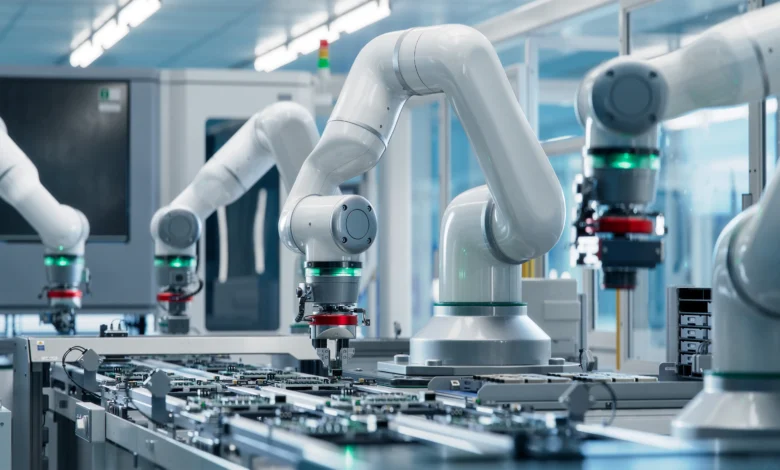Industrial Automation in the Military: Enhancing Precision and Efficiency

Industrial automation has permeated various sectors, significantly transforming operations and efficiency levels. The military sector, in particular, has seen substantial benefits from the integration of advanced automation technologies. These technologies are not only enhancing the precision and speed of manufacturing military equipment but also improving the effectiveness and safety of military operations. Among the critical components of this automation transformation are servo controllers, which play a pivotal role in ensuring the high precision required in military applications. This article explores the impact of industrial automation in the military, with a focus on how these technologies are revolutionizing the field.
The Importance of Automation in Military Manufacturing
The military industry demands the highest standards of precision and reliability. Equipment and devices used in military applications must perform flawlessly under extreme conditions, as any failure can have dire consequences. Automation in military manufacturing provides several key benefits:
1. Enhanced Precision and Quality Control
- Automated systems, controlled by advanced servo controllers, enable the precise assembly of complex military hardware, from vehicles to weaponry. These controllers ensure that components are manufactured and assembled with exacting accuracy, minimizing human error and enhancing the reliability of the end products.
2. Increased Production Speed
- Automation allows for the rapid production of military equipment, a critical advantage in times of heightened defense needs. Automated production lines can operate continuously, significantly outpacing the capabilities of manual labor.
3. Improved Safety
- The use of robots and automated machinery in the manufacturing process reduces human exposure to hazardous environments, particularly in the production of explosives or when handling toxic materials.
Applications of Industrial Automation in Military Operations
1. Manufacturing of Vehicles and Equipment
- Military vehicles, such as tanks and armored personnel carriers, benefit from the precision provided by automation in both the assembly line and the machining of individual parts. Servo controllers play a crucial role in the production of these vehicles, managing the movement of assembly robots and ensuring that each part fits perfectly to meet strict military specifications.
2. Aerospace and Aviation Components
- The production of military aircraft demands extremely high standards of accuracy and quality. Automation technologies are used extensively in the fabrication of aircraft components, including critical items like jet engines and avionics. Servo controllers ensure the precise positioning of parts during assembly, critical for maintaining the integrity and performance of aircraft systems.
3. Munitions and Explosives Manufacturing
- Automation in the production of munitions ensures consistency and safety, significantly reducing the risk of accidents. Machines handle dangerous materials and perform tasks such as filling shells and assembling detonators, with minimal human intervention.
4. Maintenance and Repair Operations
- Automated systems are also used in the maintenance and repair of military equipment. Robots can perform routine maintenance tasks and repairs, often in environments that are unsafe for humans. These systems use advanced diagnostics to detect faults and perform repairs, guided by servo controllers like the DKC02.1-040-7-FW that ensure precise manipulation of tools and parts.
Challenges of Industrial Automation in the Military
Despite its many benefits, the integration of industrial automation into military operations is not without challenges:
1. High Costs
- The initial investment required for high-quality automation systems can be significant, especially when adapting existing military production facilities to accommodate new technologies.
2. Cybersecurity Risks
- Increased reliance on automated systems raises concerns about cybersecurity. Military systems require robust protection to prevent cyber-attacks that could disrupt manufacturing operations or compromise sensitive data.
3. Technological Integration
- Integrating new automation technologies with existing military systems can be complex, requiring extensive customization and testing to ensure compatibility and reliability.
Future Outlook
The future of industrial automation in the military looks to incorporate even more advanced technologies. Developments in artificial intelligence and machine learning are expected to drive the next wave of innovations, enabling more autonomous and adaptive systems. These technologies could further enhance decision-making processes, improve predictive maintenance, and lead to the development of smart weaponry and unmanned vehicles, all controlled with greater precision by advanced servo systems.
Conclusion
Industrial automation, spearheaded by technologies like servo controllers, is playing a crucial role in transforming military operations and manufacturing. By enhancing precision, speeding up production, and improving safety, automation is helping to meet the rigorous demands of modern military needs. As technology continues to advance, the integration of more sophisticated automation solutions will likely drive further improvements in this critical sector, ensuring that military capabilities keep pace with the evolving challenges of defense and security.



